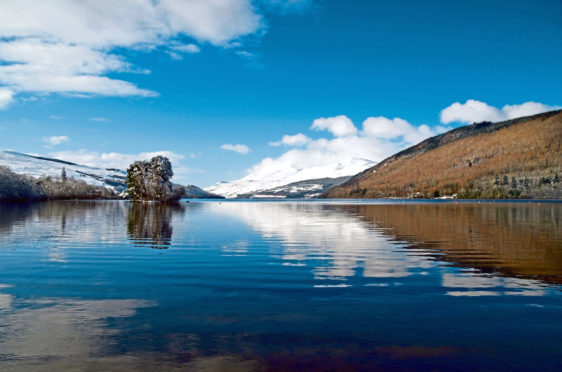This is typed from the same desk as my first column for a newspaper, written 18 years ago. I look up and there is the same view of Loch Tay. In the foreground a burn and some trees, then a field, patchy with reeds. Then the loch water, with a pattern of light that is never the same across the surface. And then the hills to the south.
This unchanging landscape has seem me writing countless words.
I have absorbed this view since 1991, when I first came to this house. Then, perky with arrogance, I could not have processed the idea that I would know anything for so long, or rather, that I would look back on the same thing from such a distance. I imagined life would be an express journey into new things. Despite my nationalist leanings, I yearned for abroad and the excitement of the world. Had you told the young journalist that he’d write of being in the same place for 27 years, he’d have turned angry at the insinuation of a parochial career.
Yet life has a knack of setting the rules for us, of determining where we stay and what we see, We are held in a balance between what happens and what we think is happening. For an opinion writer, this is particularly so. Looking out at this view, my mind has been thinking about planes crashing into the Twin Towers, of the Iraq War, of the achievements and disappointments of Tony Blair. My eyes have seen the loch and the hills, when my mind has been thinking of Gordon Brown and the financial crash, of David Cameron, of the SNP’s astonishing rise.
This is how it is for all of us. We commute along the same roads, almost thoughtless to the familiar turns as we wonder about our problems or the price of fuel. Our lives play out against the streets of Dundee, the swirl of personal emotion framed by the same buildings.
It is only when landmarks like the old council building are removed that we are suddenly reminded of the space around us. The best example of this is when a crop of trees is harvested and a road which was once draped in conifer astonishingly becomes one through open landscape. Here is the same place but suddenly new, and our thoughts connect again to the real world.
This is the last column from this desk and with this view because the house is being sold. It is time to move on. The next words will be written from a different place, and perhaps a different point of view. Change is a good thing and I’ve grown to have little truck with Scottish sentimentalism. I shall lock the door for the last time without a tear in my eye. Time moves on. Another landscape awaits, another view.
My daughter is heartbroken, but she is 15 and has known this place since birth. Her first chore, at two weeks old, was to witness the planting of a tree over a dog’s grave. Since then there have been other dogs, and many more chore. For her, having seen so much less in her life, leaving will be like losing a grip on the world, and that is upsetting.
As to the business of the words – the strange labour of mining one’s mind to meet a deadline – that continues. The spring of 1992 saw the shock UK general election, when the Tories held on despite the pundits calling it for Labour. By then Margaret Thatcher had signed us up to the Single European Act and won her rebate from Brussels. We were adjusted to the idea that the Conservatives were split on the question of Europe.
Tory anxiety about Brussels ran parallel to Scottish fervour for devolution – the 1992 electoral shock to Labour was the father of the 1997 referendum for a Scottish Parliament. We forget all this because it becomes just part of the landscape. Yet our landscape is about to be changed forever. Whether it is deal or no deal, it will still be Brexit. Once out of the EU, that is it, done.
This change to our political and cultural landscape is beyond our imagination. It is a new world of which we know nothing. Perhaps it will be mundane, but I doubt it. If we are out but following the same rules, then the Brexiteers won’t be happy. They will gnaw at this as they have chewed away at the EU. Far from British politics being free of ‘Europe’, it will think of little else .
Those who wish we have never left will also be vocal – if only we were back in the EU, they will argue at election time.
Which is sadness for the rest of us. As if we had left a house, only to constantly want to return, and to abuse the new owners. We shall leave, but forever be in thrall to the act of leaving.
Perhaps Brexit will lead to a new age of British greatness – but equally it might just let us see what Britain really is, and wonder why it was important to leave, when in truth the problem was elsewhere, or no problem at all.
We are moving on, in a way we’d never have imagined years ago. Who knows what it’ll be like, or whether we like it, but by then we will realise: you can’t go back.


